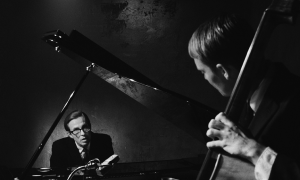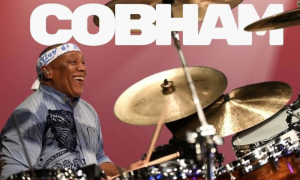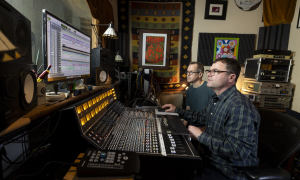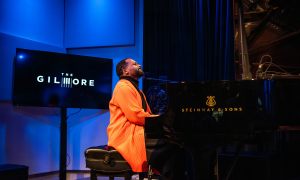As you might have heard, there are people out there who think this whole Getting Your Music Into China series is a bad idea. But in the interest of providing some additional information about what's going on inside China, I sat down with Rock in China! founders and editors Max Leonhard von Schaper and Yang Yu. In this exclusive interview, they discussed current musical trends, how to get your music into the Chinese rock scene, tips, pointers and tricks, creative trends and more.
To start this off, can you give us a quick primer and summarize the current state of music in China? Max Leonhard von Schaper: Music is, in China as in the rest of the world, big business and a multi-RMB-machinery set forward to produce the newest and hottest boy or girl band performing pop songs on TV. There is Superstar, the Chinese version of American Idol or Germany's Popstars. There are a multitude of Mandarin-singing and Cantonese-singing pop stars that have sold millions of records, who are completely unknown in Europe or the USA. And there are numerous small scenes fostering independent rock music, metal, punk, electro and jazz. Piracy, a theme featured often in Western newspaper's articles on China, is also a hot topic for the Chinese music biz. Tang Dynasty, one of the most famous rock bands of the Middle Kingdom, has allegedly sold more than 1.7 million records of their debut, though most of them were pirate records, hence the band never saw the revenue and profits they might expect with that enormous figure. Rock bands cannot survive on record sales alone and even less than in Europe or the USA are forced to either take up main-day jobs or live a poor life surviving by as many gigs as possible.
Yang Yu: It seems that the gap between pop music and rock is starting to get smaller, which means that you can find rock music or underground pop easier in mass media such as TV, radio, new media and karaoke platforms. More than ever, pop music is turning into a niche. Since the fast development of new media, traditional ways of piracy has lost its value as illegal products, but keep its function as alternative way of promotion. Generally, music is undergoing a process turning from products to content, so instead of selling CDs and Pay-Downloads, music rather appears as part of a package or other forms like live events, TV and film productions or other entertainment products.
More specifically, what do you see as the top three major trends? YY: To limit it to three: Festivals, Folk, Sexiness. The latest big attraction, of course, are all those festivals. The new formula isn't actually anything new, just the old model of outdoor music events funded by local-government-culture/tourism-money, which worked well for Midi Festival and Modern Sky ones for years. The makers behind those festival brands are also the most active festival organizers now, expanding across the whole of China. Midi alone is doing Beijing, Zhenjiang, Changsha, maybe Suzhou next year, and more.
Laure Shang, an example of the playful sexiness that's coming into vogue in China.
The other trend is a huge growth in the folk genre: indie folk, neo folk, folk rock, acoustic songwriter stuff, native traditional music in newer outfits, real ethnic folk, world music, blah blah blah. It all started some years ago in a small club called River Bar, solo artists and bands of this genre would play there in front of a very small crowd. Within a few years, this vivid genre has grown into a little giant, expanding to any and every live stages available in Beijing. Clubs like Jianghu, Tiny Salt, Jiangjinjiu, Hot Cat Club and others regularly offer folk gigs. And usually, what's good for Beijing, it's the same good elsewhere in China. You will also often find folk stages on festivals, too. The media is even talking about folk as a new movement of the rock scene.
And above all activities in rock music, sex sells. Both female and male musicians are acting in a very sexy way, both verbally and in body language (or sex appeal). It is not that bands weren't sexy some years ago, but it seems that the awareness of being sexually/visually attractive is growing. Front girls and guys no longer hide their youthful beauty / handsomeness in the typical, humble Chinese way. They go aggressively on a mass flirt with the audience. They talk sexily, smile sexily, singing about sexy stuff. Sex, impact and rock'n'roll.
How do you think American sexiness compares with Chinese sexiness? YY: I guess one big difference lies in the cultural background. In America, pornography isn't illegal, but in China it is. The traditional Chinese is quite conservative on the aspect of sex-related issues and topics, which for the revolting youth of the rock scene might be an easy catch to shock and fool around with.
I can say that the typical Chinese way of being sexy is more subtle (though in rare, contradictory occasions, also more outgoing); Chinese musicians much prefer to play with symbols and euphemisms than being direct with nudity or sex talk. I think the general American sexiness is pretty direct (a bit unsexy for my personal taste, actually) and the Chinese sexiness is more interesting and playful.
Speaking of “American" things, how popular are distinctly American folk forms of music, such as country, blues or bluegrass? How are they viewed? YY: Country, blues, rockabilly/hillbilly, and bluegrass are not unknown in China, especially what you'd call country; there is a huge fan base of American country music. Blues enjoys a small independent crowd, split into traditional black blues, white blues and Chinese blues outfits. Bluegrass surfaced in China with Abigail Washburn (& Bela Fleck) and her several successful tours throughout China. Also Iron Horse's covers of Metallica and Black Sabbath songs was quite helpful to attract the attention of otherwise rock-orientated music fans.
And in the past few years, some bands also started to catch up with the arch original form of rock, the rock'n'roll or rockabilly. Beijing Hell Cats, for example, go on stage in original '50s outfits playing down all the classics, from Elvis to Gene Vincent. So there are quite a lot things going on.
Are there certain forms of music (say, Norwegian Death Metal) that are unknown or completely unpopular in China? MLS: Strangely enough, Norwegian Death Metal fills halls in China! I guess every music genre that is around is known in China. Many might be unpopular, but then how popular is avant-garde noise in Germany? YY: [Here] Norway on the map of rock isn't really well-known for its death metal bands, but there a bench of fanatics into Norwegian black metal. I'm sure there are newer music forms that are still not popular in China yet, but it's hard to say those are unknown. It just takes a little bit time until a fashion wave catches on with the Chinese crowd.
Metal Core, for example, was a hip movement some years ago, and now Chinese metal kids are starting to get a bit warm to it. The same for post-rock, but somehow other styles like stoner/sludge never really had an impact on Chinese rock fans.
Xe Tian Xiao, or XTX, has been active in the Chinese rock scene for 13 years.
So does China's rock scene have heroes and idols that are non-American? MLS: Definitely no, and definitely yes! Yes, because people like XTX or Cui Jian have given their music a distinct Chinese flavor, that has given their songs an importance for their own people and their own scene. And no, because due to the presence of rock in the Western world for so many years, the first [Chinese] bands listened to Simon & Garfunkel, The Beatles, Scorpions and all the other rock stars. Nowadays, the kids go crazy for Lamb of God, Peachez and Saosin, and they organize their own music concerts, do their own promotion and kickstart their own things. The most important element that might have influenced the scene is probably Kurt Cobain and his DIY attitude.
Are Chinese ears tuned to appreciate different progressions, sounds, performative elements, or other musical trends? MLS: Many people in China are too busy to focus on the particulars of music. They listen to the radio, enjoy the general mainstream in the same way as a quick escape from daily life, as it happens in Europe. There is a small circle of dedicated rock fans, dedicated punks, dedicated indie fans and dedicated metalheads out there that tries to dig into as many sounds as possible. Some of the most sophisticated avant-garde sound artists live in Beijing doing their thing. If a band comes from overseas you can be sure that there are minimum 500-1,000 people somewhere in this country that can understand and appreciate even the most extreme niche of musical expression. The more mainstream the band (and more known) the higher the number of people that will go apeshit.
In your opinion, what are the top five pointers an American musician would need to keep in mind in order to “break" themselves in the Chinese music scene? Or is it even possible? MLS: I don't think the “5 keys to success" list for China is so much different from the one you'd use overseas:
China-specific things to bear in mind could be:
The Rock in China! logo
What are the similarities and differences of the Chinese music scene to the rest of the world? MLS: Similarities:
Differences:
The final, most important question, then: what's the likelihood of an American artist breaking into the music scene? MLS: That totally depends upon the eagerness and hard work of that artists. The world is an open one, if you have the guts to appreciate it, you get the glory. No guts, no glory! YY: As for artistic individuals just come here and play, be good at it and go as often on stage as possible, hook up with the scene people, get around in China and see how it works. If you want break into the music scene, you'd have to do what ever people in the scene do. There is no real short cut.
To start this off, can you give us a quick primer and summarize the current state of music in China? Max Leonhard von Schaper: Music is, in China as in the rest of the world, big business and a multi-RMB-machinery set forward to produce the newest and hottest boy or girl band performing pop songs on TV. There is Superstar, the Chinese version of American Idol or Germany's Popstars. There are a multitude of Mandarin-singing and Cantonese-singing pop stars that have sold millions of records, who are completely unknown in Europe or the USA. And there are numerous small scenes fostering independent rock music, metal, punk, electro and jazz. Piracy, a theme featured often in Western newspaper's articles on China, is also a hot topic for the Chinese music biz. Tang Dynasty, one of the most famous rock bands of the Middle Kingdom, has allegedly sold more than 1.7 million records of their debut, though most of them were pirate records, hence the band never saw the revenue and profits they might expect with that enormous figure. Rock bands cannot survive on record sales alone and even less than in Europe or the USA are forced to either take up main-day jobs or live a poor life surviving by as many gigs as possible.
Yang Yu: It seems that the gap between pop music and rock is starting to get smaller, which means that you can find rock music or underground pop easier in mass media such as TV, radio, new media and karaoke platforms. More than ever, pop music is turning into a niche. Since the fast development of new media, traditional ways of piracy has lost its value as illegal products, but keep its function as alternative way of promotion. Generally, music is undergoing a process turning from products to content, so instead of selling CDs and Pay-Downloads, music rather appears as part of a package or other forms like live events, TV and film productions or other entertainment products.
More specifically, what do you see as the top three major trends? YY: To limit it to three: Festivals, Folk, Sexiness. The latest big attraction, of course, are all those festivals. The new formula isn't actually anything new, just the old model of outdoor music events funded by local-government-culture/tourism-money, which worked well for Midi Festival and Modern Sky ones for years. The makers behind those festival brands are also the most active festival organizers now, expanding across the whole of China. Midi alone is doing Beijing, Zhenjiang, Changsha, maybe Suzhou next year, and more.
Laure Shang, an example of the playful sexiness that's coming into vogue in China.
The other trend is a huge growth in the folk genre: indie folk, neo folk, folk rock, acoustic songwriter stuff, native traditional music in newer outfits, real ethnic folk, world music, blah blah blah. It all started some years ago in a small club called River Bar, solo artists and bands of this genre would play there in front of a very small crowd. Within a few years, this vivid genre has grown into a little giant, expanding to any and every live stages available in Beijing. Clubs like Jianghu, Tiny Salt, Jiangjinjiu, Hot Cat Club and others regularly offer folk gigs. And usually, what's good for Beijing, it's the same good elsewhere in China. You will also often find folk stages on festivals, too. The media is even talking about folk as a new movement of the rock scene.
And above all activities in rock music, sex sells. Both female and male musicians are acting in a very sexy way, both verbally and in body language (or sex appeal). It is not that bands weren't sexy some years ago, but it seems that the awareness of being sexually/visually attractive is growing. Front girls and guys no longer hide their youthful beauty / handsomeness in the typical, humble Chinese way. They go aggressively on a mass flirt with the audience. They talk sexily, smile sexily, singing about sexy stuff. Sex, impact and rock'n'roll.
How do you think American sexiness compares with Chinese sexiness? YY: I guess one big difference lies in the cultural background. In America, pornography isn't illegal, but in China it is. The traditional Chinese is quite conservative on the aspect of sex-related issues and topics, which for the revolting youth of the rock scene might be an easy catch to shock and fool around with.
I can say that the typical Chinese way of being sexy is more subtle (though in rare, contradictory occasions, also more outgoing); Chinese musicians much prefer to play with symbols and euphemisms than being direct with nudity or sex talk. I think the general American sexiness is pretty direct (a bit unsexy for my personal taste, actually) and the Chinese sexiness is more interesting and playful.
Speaking of “American" things, how popular are distinctly American folk forms of music, such as country, blues or bluegrass? How are they viewed? YY: Country, blues, rockabilly/hillbilly, and bluegrass are not unknown in China, especially what you'd call country; there is a huge fan base of American country music. Blues enjoys a small independent crowd, split into traditional black blues, white blues and Chinese blues outfits. Bluegrass surfaced in China with Abigail Washburn (& Bela Fleck) and her several successful tours throughout China. Also Iron Horse's covers of Metallica and Black Sabbath songs was quite helpful to attract the attention of otherwise rock-orientated music fans.
And in the past few years, some bands also started to catch up with the arch original form of rock, the rock'n'roll or rockabilly. Beijing Hell Cats, for example, go on stage in original '50s outfits playing down all the classics, from Elvis to Gene Vincent. So there are quite a lot things going on.
Are there certain forms of music (say, Norwegian Death Metal) that are unknown or completely unpopular in China? MLS: Strangely enough, Norwegian Death Metal fills halls in China! I guess every music genre that is around is known in China. Many might be unpopular, but then how popular is avant-garde noise in Germany? YY: [Here] Norway on the map of rock isn't really well-known for its death metal bands, but there a bench of fanatics into Norwegian black metal. I'm sure there are newer music forms that are still not popular in China yet, but it's hard to say those are unknown. It just takes a little bit time until a fashion wave catches on with the Chinese crowd.
Metal Core, for example, was a hip movement some years ago, and now Chinese metal kids are starting to get a bit warm to it. The same for post-rock, but somehow other styles like stoner/sludge never really had an impact on Chinese rock fans.
Xe Tian Xiao, or XTX, has been active in the Chinese rock scene for 13 years.
So does China's rock scene have heroes and idols that are non-American? MLS: Definitely no, and definitely yes! Yes, because people like XTX or Cui Jian have given their music a distinct Chinese flavor, that has given their songs an importance for their own people and their own scene. And no, because due to the presence of rock in the Western world for so many years, the first [Chinese] bands listened to Simon & Garfunkel, The Beatles, Scorpions and all the other rock stars. Nowadays, the kids go crazy for Lamb of God, Peachez and Saosin, and they organize their own music concerts, do their own promotion and kickstart their own things. The most important element that might have influenced the scene is probably Kurt Cobain and his DIY attitude.
Are Chinese ears tuned to appreciate different progressions, sounds, performative elements, or other musical trends? MLS: Many people in China are too busy to focus on the particulars of music. They listen to the radio, enjoy the general mainstream in the same way as a quick escape from daily life, as it happens in Europe. There is a small circle of dedicated rock fans, dedicated punks, dedicated indie fans and dedicated metalheads out there that tries to dig into as many sounds as possible. Some of the most sophisticated avant-garde sound artists live in Beijing doing their thing. If a band comes from overseas you can be sure that there are minimum 500-1,000 people somewhere in this country that can understand and appreciate even the most extreme niche of musical expression. The more mainstream the band (and more known) the higher the number of people that will go apeshit.
In your opinion, what are the top five pointers an American musician would need to keep in mind in order to “break" themselves in the Chinese music scene? Or is it even possible? MLS: I don't think the “5 keys to success" list for China is so much different from the one you'd use overseas:
- Tour a lot! More gigs! There should be no stage, no mattress in no shitty place that you haven't seen and slept on!
- Work your ass off on your music, create some good music
- Interact with your fans, be present, have some mystique, be natural, be there when they need you
- Spread your music, hand out free CDs, have an updated myspace/Douban/whatever page
China-specific things to bear in mind could be:
- Don't expect things to run smoothly. Even though the skyscrapers are tall, this is Asia, not everything works in the same fashion as at home
- Learn a couple of words of Chinese. Remember: When people at home speak your language, you feel more friendly towards them. The same is true in China. Learn to say “Niu bi"!
The Rock in China! logo
What are the similarities and differences of the Chinese music scene to the rest of the world? MLS: Similarities:
- Lots of sharks in the business trying to make money
- Lots of enthusiastic individuals that are idealists and trying to do something for the music
- Nothing is for free
Differences:
- The sound guy knows less about sound than you (in most clubs)
- The food is spicy, and you'll probably get a running stomach in the first week
- The hard liquor is harder
The final, most important question, then: what's the likelihood of an American artist breaking into the music scene? MLS: That totally depends upon the eagerness and hard work of that artists. The world is an open one, if you have the guts to appreciate it, you get the glory. No guts, no glory! YY: As for artistic individuals just come here and play, be good at it and go as often on stage as possible, hook up with the scene people, get around in China and see how it works. If you want break into the music scene, you'd have to do what ever people in the scene do. There is no real short cut.
























